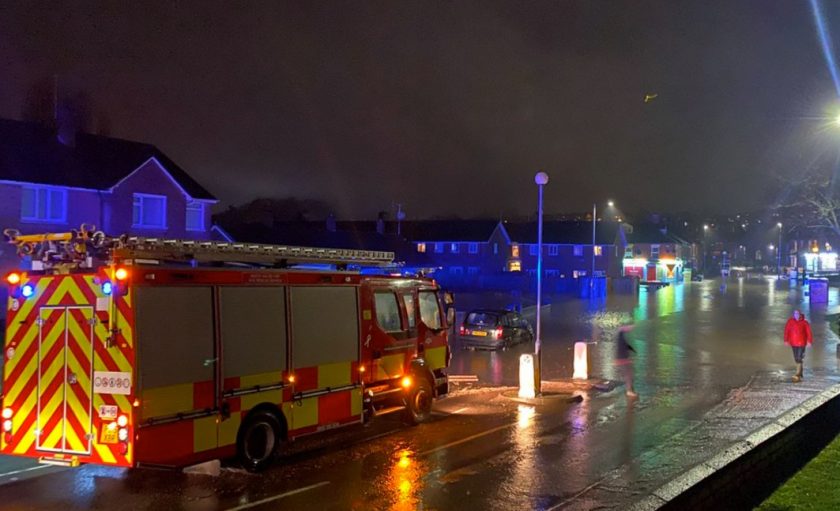Council sending sandbags after floods “like sending a lifeboat to the Titanic after it’s already sunk”

Communication problems are partly to blame for a slow recognition to the seriousness of floods caused by Storm Christoph a committee has found.
As reported yesterday councillors whose wards were badly affected by flooding earlier this year were detailing their concerns over the response to Storm Christoph before the council’s homes and environment scrutiny committee.
On January 20 the region was hit by heavy rainfall, causing flash flooding and road closures across Wrexham throughout the day. Several areas of the county borough were particularly affected by flooding, with homes evacuated in New Broughton, Bangor-on-Dee and Almere Farm, near Holt. Parts of Rossett and the Ceiriog Valley were also hit by flooding – with the heavy rainfall also causing a landslide in Newbridge.
A very late on-the-day addendum was made public ahead of the meeting, pointing out flaws in the report before the committee saying it “does not do justice to either the severity of the flooding experienced in New Broughton starting in the afternoon and its impact on the community, or the role played by the local Members in having to take the lead in addressing the immediate problems that their communities faced”
It adds that councillors “felt that the extent of damage was more severe and widespread than in the summary and that there were breakdowns in communication which resulted in resources, such as officers on the ground, evacuation procedures and practical help, such as sandbags, not being made available at the moment of critical need and that they were left to their own resources”.
As a result, the report prepared by Cllrs David Kelly and Cllr David A Bithell along with council officers Lawerence Isted, Steve Bayley and Darren Williams was amended to ‘better reflect the situation on the night’.
The meeting was attended by representatives from Natural Resources Wales (NRW), Wrexham Council’s Environment department and other senior council officers, North Wales Council’s emergency regional planning service, local volunteer flood wardens, and a range of councillors. Welsh Water ‘did have an invite but they have declined’.
Chief Officer Lawerence Isted, who has public protection as part of his role presented the report noting there were three strands to it, the immediate response and recovery, and the emergency planning aspect. Mr Isted made it clear the report dealt with on improvements to be made rather than a detailed account of the events and subsequent days after the storm.
The ‘principle’ lesson to learn was summarised as “gaining early intelligence on and effectively communicating both the severity and extent of an emergency”, something that was found lacking in several accounts of the immediate response.
Mr Isted referenced, “I’d ask you to remember that no one was harmed despite the unprecedented extent and severity in the flooding that occurred”.
Later in the meeting Cllr Alun Edwards was very vocal when ‘activating plans when life threatening’ was referenced, detailing his experience of what he saw as a threat to life and possible close call for a severely ill elderly gentlemen in a flooded home, “We had to get medical things in there to him because we couldn’t move him. So that was life threatening. It might be only one person, but that one person was life threatening. It shouldn’t be about a lot of people having life threatened, every individual should count.”
Cllr Nigel Williams also documented the situation in New Broughton, “In one case, we help to a mum, dad and baby out of the living room window. There are also residents which we had to evacuate in the 80s and 90s. Some with serious health conditions, and they have been taken out by dingy.”
Cllr David Kelly spoke of the reasons behind the New Broughton flood, “The unique event in New Broughton was caused by the Gwnefro over topping its banks because a drainage culvert that goes into the road was blocked with debris. This issue arose on private land, they didn’t arise on a council maintained drain. 90% of the cases of flooding that we’re seeing the root causes originated on private land, water courses and drainage ditches are unmaintained that have been unmaintained for a long time.”
The NRW representative told the meeting about such private landowners, “There is a requirement or responsibility on landowners to receive flood water and allow water to pass freely through their land. There is no duty in common law to improve the drainage capacity of a watercourse that he or she owns. ”
Wrexham Council’s Chief Officer Darren Williams added some context to the response, “Just to give you an idea of the scale, on the evening we estimate we our teams attended and dealt with between 150 and 200 separate incidents dotted throughout the county borough”
“Around 2000 sandbags were deployed to various different locations. I have to say here some not always as timely as we would have liked, but we endeavoured to get everything out as best as we could.”
“During the peak of the emergency we had between 40 and 50 staff out on on site, I have to say we’re not alone in that I know colleagues from other services also have a similar level.
“To bring you back to that time, within about 24 hours of the significant flooding, we then saw a period of extremely cold weather and we went straight into winter maintenance service.
“All in all, it proved quite a challenging time for everyone concerned, not least those communities most impacted.”
Cllr David A Bithell, Lead Member for the Environment revealed that senior officers were at one stage looking to evacuate Bangor on Dee as events ‘could have been catastrophic’.
Cllr Bithell added, “We do need to look at how we manage and support communities that could get cut off. I think we were lucky in this instance. I remember one of the comments made from NRW is that the river levels down in Bangor on Dee were the highest recorded on history. It could be worse next time. So I think we do need to prepare, we do need to learn the lessons with potentially how we communicate with elected members and how we communicate with members of the public in emergencies of this scale.”
Jon Holland from the North Wales Regional Emergency Planning Service detailed the impact of the pandemic in the response to the storm, saying ‘every part was calculated through a set of Covid goggles’. The storm came as no surprise as ‘there had been some severe weather teleconferences that have been going on for a few days beforehand between all agencies’, and his operations had been ‘stood up in the days prior’.
A flood warden from Bangor on Dee noted early surface road flooding by the early evening, a problem that ‘has been an ongoing issue two or three times a year for the past three or four years’, adding that they felt ‘totally on their own’ in the early response. They pointed out that Wrexham Council has a responsibility under the floor plan for environmental health issues, recording that residents were ‘struggling to use their bathroom facilities’ for days after the storm.
A flood warden from Rossett was critical over communications, stating that the ‘wrong phone number was made available’ to request sandbags, and that problem alone ‘led to quite a few people having water over their doorsteps’. They also documented how some people have not yet been able to return to their flooded properties due to damage done. A new flood plan was requested as the current document ‘was out of date’, along with a call for a range of drains to be ‘dealt with’.
With the issue of sandbags being mentioned several times, clarity was sought from a flood warden who says they were told ‘it wasn’t the council’s responsibility’.
Darren Williams replied, “We do supply sandbags. Obviously, we can’t be everywhere at all times. As I said, I think we we dished out about 2000 of the night. So yes, we do supply sandbags.”
Cllr Trevor Bates detailed issues in Pontfadog, asking NRW direct “What are you doing?” adding that the Ceiriog Valley is about 20% of the surface area of the county borough with rain catchment “It goes into the area which is the fastest flowing river in in Wales, thankfully for us in the valley, but it takes it straight down to Bangor on Dee doesn’t it? I think we should be doing things to help in our area.”
“I’m in a quandary here over surface water drains. It’s brilliant that they take the water away, but the problem is they take it straight into the river, which then has got nowhere to go further down country. It’s it’s one of those you’re damned if you do you’re damned if you don’t.”
Cllr Bates detailed how one area has had ‘a few crumbs’ of funding to increase the size of a 24 inch pipe, however he pointed out downstream there is only an 18 inch pipe – and thus future problems.
Cllr Paul Rogers digitally submitted his points, “Not all instances of flooding in the communities are included in the report. For example, a number of properties were flooding in Brymbo. Sandbags were dispatched, but they were delivered to the wrong address. There was significant flooding of Blast Road causing significant damage to the highway and the drainage. However, responses of officers to this issue in the days after is to be commended.
Cllr Nigel Williams, who had given the most damning narrative in the report before members, said “We need to learn from history. If we do not identify mistakes we’ve made we cannot learn from them and try to improve. I feel so sorry for the local residents affected. I’m glad we’re here to be looking at how we can react more speedily and productively if such an occurrence happens again. Once is a mistake, twice will be unforgivable.”
Pointing to the detail in the report that mentions several properties affected in New Broughton, Cllr Williams corrected that to ‘more like 20″.
Cllr Williams challenged the council, “I would like to know why and what went wrong from the alarm being raised by local councillors at 4:25PM , and the many calls made by local residents, to the arrival of the first out of hours officers and housing officers after seven o’clock, why was there such a delay?”.
Cllr Williams documented and praised the community effort ‘at a time of extreme covid in January’ to transport people to a church that had been opened for use, but pondered what would happen without a proactive councillor, and called for a ward-by-ward plan.
On sandbags Cllr Williams was scathing, asking where the much talked about 2000 sandbags went, “It seems none went to Bangor on Dee, none went to Rossett and certainly none came to New Broughton. Residents had to got to B&Q and buy them themselves.”
After the floods sandbags did turn up, “What was the point of them after the fact” It’s like sending a lifeboat to the Titanic after it’s already sunk. Initially the environment department were not keen on having sandbags for New Broughton, and we were told that it wasn’t a great idea to have a local stock, strategically it was better for them to be in the depo. Obviously this plan did not work on the night. Thankfully, we do have a stock now of sandbags in the village.”
Cllr Williams spent several minutes praising emergency services and mountain rescue teams for on the night work, the environmental teams and housing teams for their work in subsequent days.
Cllr Alan Edwards praised Cllr Williams for stepping in and help cover his ward for him on the evening due to personal circumstances, “I’d like to thank Nigel personally for the tremendous work he done that night for the residents, and the residents that themselves pulled around. He was tremendous that night, and it wasn’t his ward.”
Moving to the issue of flooding he added, “I’ve never seen the Gwenfro over flood like that. It was basically because there was trees blocking it, and the river banks themselves are collapsing. Unless those banks are looked after we are going to get more of it.”
“On what we have learnt, we have got more rivers than the Dee in this area, we can’t put all resources into one place. People have to spread out and listen to what councillors say. Councillors have got to have a number to get straight though to Gold Command. The communications were terrible.
“We have had the addendum because we thought the report did not reflect the night. It said sandbags were fetched. They weren’t. We did not receive one sandbag.
Cllr Rodney Skelland was the final councillor speaking of specific issues in Bangor on Dee noted how he had walked around a month after the flooding and observed a main drain completely blocked, “This is the main highway drain and everything. So not only was the water pouring into the village, but the water couldn’t get out of the village when it got in. I think it’s all about maintenance.”
Local flood wardens and many councillors were critical of the ‘Delta’ service provider who run call response systems for the council, with Cllr Marc Jones pointing out council managers ‘having to wait in a queue to contact Delta’, adding “Surely, if we’ve got an established network and emergency plan, there should be direct contact between council managers and delta managers?”
Cllr Jones also called for specific updates on the lessons and responses to debate, “I don’t want us to have another emergency and found that things that were promised, haven’t been acted upon”.
Cllr Sonia Benbow-Jones documented a change in flooding patterns locally, “I’ve had residents who have never been flooded in 22 years and over the last 18 months, they’ve had four floods. It comes down to having land higher above us. It’s private land, its water courses, it ditches, it is channels. They have to be addressed.”
Speaking out the Newbridge landslip she queried, “How many other vulnerable areas, bridges, roads, not just being bordered by a watercourse, but maybe being impacted by water that is building up behind us, because we are getting more water with higher intensity hitting on land. It’s not being taken away. It’s a ticking time bomb. I’m really worried about that risk across the whole county.”
Cllr Terry Evans shared that he had his own pumping station for 30 years and understood drains ‘in a big way’, telling the meeting things needed to ‘get back to basics’ to ensure drains are clean and cleared.
Chief Officer Darren Williams told the meeting there were over 30,000 gullies to clean, with 70% cleaned in the last 12 months, hinting such performance might not have always been the case: “I have to hold my hands up. For many years, that maintenance system did lapse, but we are back on with that now, and have been for the last 18 months. The problem is when the weather gets bad and the water comes as it comes in storm events, all the debris that it brings with it, it almost nullifies the gullies.”
Mr Williams also detailed issues with dealing with ditches and other watercourses on private land, “It is responsibility of the riparian landowner, even for ordinary water courses. It’s not the environments department’s responsibility to go and do the work. But in the same way NRW regulate, we regulate it for ordinary water courses. So the challenge then gets passed back to individual landowners, farmers and other people, so it becomes a vicious circle.”
With the outpouring of issues and accounts large and small the meeting moved towards recommendations, with Mr Isted reiterating the ‘learning’, “I think we need to improve our communications to and from Delta, and also our trigger points because I think there was a feeling ‘well it’s only three or four premises or six or seven houses, that’s normal activity’, where does that trigger point come?”
Chief Officer Housing & Economy Steve Bayley agreed issues around the Delta service needed addressing, “I think there’s a fundamental review needed in terms of the fitness for purpose of the Delta out of care for this kind of event. I think it’s perfectly adequate for what it’s designed for, which is social care. But for this event, we might need to invent something of our own or do something different.”
Mr Bayley pointed to an information gap from 4:30PM to around 6:30-7PM, “We have to resolve that. If we get that right the rest of it flows, because everything else around the response, the clean up, it all worked. Get that front end right, thats great, but more fundamentally, we stop it in the first place and we do other things as well. We’ll be in a much better position.”
Cllr David A Bithell echoed that point, “The recovery in general terms was good. I think we do need to review the incident command, including Delta.”
Ten points were raised for recommendations out of the committee, although with officers dipping into the forming of the recommendations of the committee some elements that were requested, for example circulating flood plans, will not happen. Likewise a request to for “a more proactive maintenance regime be adopted for highway gullies that if possible watercourses be cleared” was knocked on the head by Mr Williams who suggested the committee tread carefully, ‘because we can do more but it will cost more’, adding ‘watercourse maintenance generally doesn’t lie in the council’s gift, that’s landowner matter’ but did say they ‘can ask landowners to do it’
The recommendations and outputs agreed were:
- Thanking all those involved in the response to the incident
- Expressing concerns over the command over the incident and communication with Delta
- Approaching Welsh Government to look for funding of the Newbridge landslip repairs from flood relief funds.
- Existing community flood plans are circulated to councillors and reviewed jointly with NRW and other agencies.
- Existing community flood plans are redacted and then reviewed jointly with NRW and other agencies, but not sent to councillors.
- The environment department bringing ‘a paper’ back in the future to detail maintenance regimes.
- An ‘progress report’ in six months time.
- “Support” for flood wardens.
- WCBC look at the use of social media to inform residents and others in future emergencies.
- Hold a private workshop with stakeholders to look at ‘members role in emergencies’, held in an ‘open and transparent’ manner behind closed doors. (Cllr Jones asked if that could be webcast, and was told no.)
Top picture: New Broughton flooded.
Spotted something? Got a story? Email [email protected]












